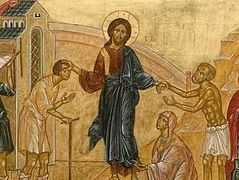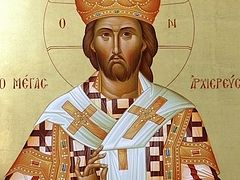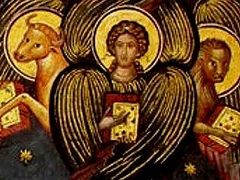1. A man goes in to bend the knee, and his heart is filled with the divine influence, and his soul rejoices with the Lord, like bride with bridegroom, according to that word of the prophet Esaias which says, As the bridegroom rejoiceth over the bride, so shall the Lord rejoice over thee;1 and it comes to pass that being all day engaged he gives himself to prayer for an hour, and the inward man is rapt in prayer into the unfathomable deep of that other world in great sweetness, so that his whole mind is up aloft, rapt away thither, and estranged from things below. For the time being forgetfulness comes into him with regard to the interests of the earthly mind, because his thoughts are filled and taken captive to divine and heavenly things, to things infinite and past comprehension, to wonderful things which no human lips can express, so that for that hour he prays and says, "Would God that my soul might pass along with my prayer!"
2. Question. Can anyone enter into these things at all times?
Answer. Grace is constantly present, and is rooted in us, and worked into us like leaven, from our earliest years, until the thing thus present becomes fixed in a man like a natural endowment, as if it were one substance with him. But, for the man's own good, it manages him in many different ways, after its own pleasure. Sometimes the fire flames out and kindles more vehemently; at other times more gently and mildly. The light that it gives kindles up at times and shines with unusual brightness; at others it abates and burns low. The lamp is always burning and shining, but when it is specially trimmed, it kindles up with intoxication of the love of God; and then again by God's dispensation it gives in, and though the light is always there, it is comparatively dull.
3. To some, however, the sign of the cross has appeared in light and fastened itself upon the inward man. At another time a man at his prayers has fallen into a kind of trance, and found himself standing in the altar-space in church, and three loaves were offered to such an one, leavened with oil, and the more he ate of them, the more they increased and grew. At another time there was brought as it were a shining garment, such as there is none on earth in the course of this world, nor is it possible for human hands to make the like; for as when the Lord went up into the mountain with Peter and John, He changed the fashion of His raiment and made it to flash with light, so was it with this garment, and the man who was clothed with it wondered and was amazed. Another while, the light shining in the heart disclosed the inner, deeper, hidden light, so that the man, swallowed up in the sweetness of the contemplation, was no longer master of himself, but was like a fool or a barbarian to this world by reason of the surpassing love and sweetness, by reason of the hidden mysteries; so that the man for that season was set at liberty, and came to perfect measures, and was pure and free from sin; yet afterwards grace retreated, and the veil of the adverse power came; notwithstanding, grace still shews itself in part, and he stands on the first and lowest step of perfection.
4. There are twelve steps, we might say, which a man has to pass before he reaches perfection. For a season that measure has been attained, and perfection entered upon; and then grace gives in, and he comes down by one step, and stands on the eleventh. Here and there one man rich in grace has stood always, night and day, in perfect measures, at liberty and in purity, always captive and aloft. Well now, if the man to whom those marvelous things were shewn, of which he has had actual experience, were to have them always present with him, he would be unable to undertake the dispensation of the word and the burden of it, nor could he endure to listen to, or take any interest in, any ordinary thing, concerning himself, or concerning the morrow, but only to sit in a corner, aloft and intoxicated. So the perfect measure has not been given, in order that he may be free to take an interest in his brethren, and in the ministry of the word. Nevertheless the middle wall of partition has been broken through2 and death is overcome.
5. The case stands thus, as if some foggy power hangs over and forms a light screen, like a dense air, though the lamp is burning and shining all the while, even as a veil hangs over yonder light. So this man confesses that he is not perfect or altogether free from sin. He says that the middle wall of partition has been broken through and shattered, and yet, at some point not wholly broken, nor at all times. There are moments when grace kindles up and comforts and refreshes more fully; there are moments when it retreats and clouds over, according as grace itself manages for the man's advantage. But who is there that has come to the perfect measure at particular seasons, and has tasted and had direct experience of that world? A perfect Christian man, one completely free, I have not yet seen. Although one and another is at rest in grace, and enters into mysteries and revelations and into much sweetness of grace, still sin is yet present within. By reason of the exceeding grace and of the light that is in them, men consider themselves free and perfect; but inexperience deceives them. They are under the influence of grace, but I have never yet seen a man that is free. I myself at times have in part come to that measure, and I have learned to know that it does not constitute a perfect man.
6. Question. Tell us, if thou wilt, what measures thou art in?
Answer. After the sign of the cross,3 grace now acts thus. It calms all the members and the heart, so that the soul, for much joy, appears like an innocent child, and the man no longer condemns Greek or Jew, sinner or worldling. The inner man regards all men with a pure eye, and the man rejoices over all the world, and desires that all should worship and love, Greeks and Jews. At another moment, like the king's son, he is as bold in the Son of God as in a father, and doors are opened to him, and he enters within to many mansions,4 and the further he goes in, doors are again opened in progression, a hundred mansions leading to a hundred beyond, and he is rich, and the richer he is, other new wonders are again disclosed to him, and he is entrusted, as a son and an heir, with things that cannot be told by mankind or put into syllables by mouth and tongue. Glory to God. Amen.







